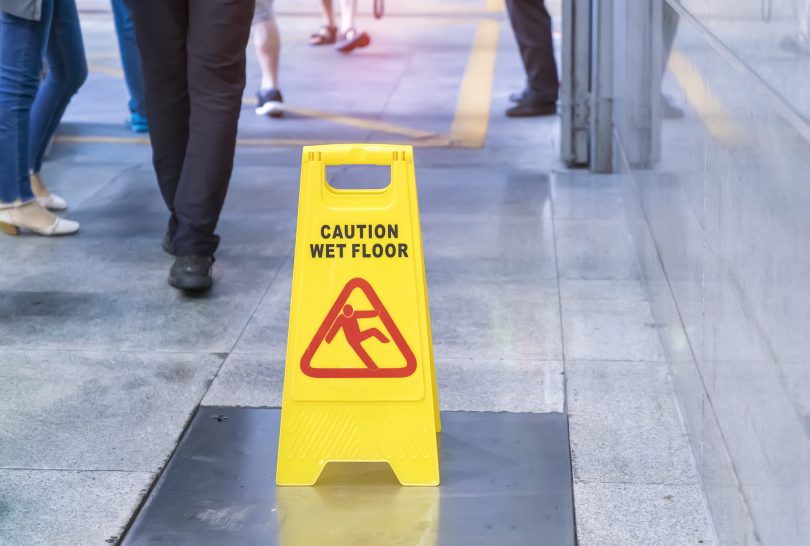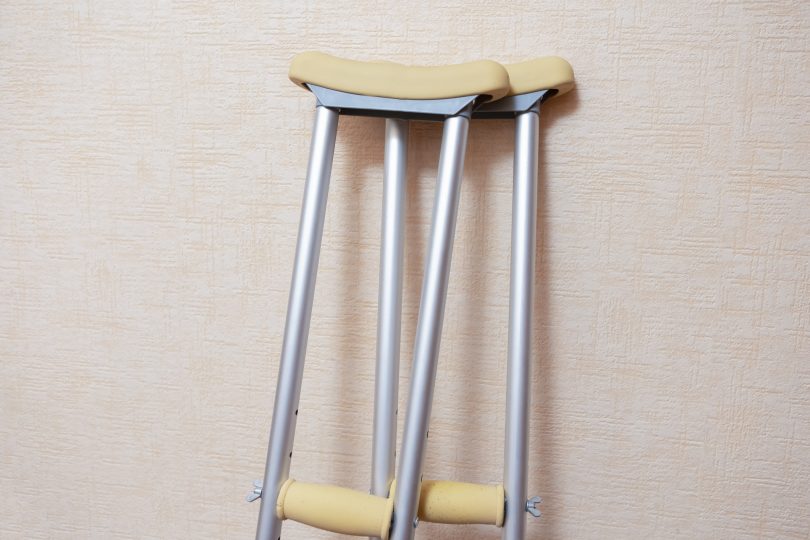
How will weather events impact the nature of personal injuries in the ACT? Photo: Kynny.
Caution: Wet Floor.
It’s not a particularly alarming sign and, certainly recently, has been common enough. And it will continue to be so well into winter if expert wet weather predictions are correct.
But benign as it may seem, slip and falls should not be trifled with, and they’re just one way recent weather may impact patterns of personal injury, according to Maliganis Edwards Johnson (MEJ) partner James Treloar.
“It’s obviously been wetter in the ACT, which can lead to greater risk of harm,” he says.
“For example, constant and heavy rain can lead to a deterioration in roadways, which fall into disrepair from potholes and degradation. This can cause issues for cyclists and e-scooter users in particular. It stands to reason recent weather events, particularly wet weather, will cause obstacles and hazards for road users.
“Then in the colder months, slips and falls are common in Canberra as the paths can get icy.”
Personal injuries can be costly in more ways than one. Financially there are medical bills and lost income from the inability to work. These may be dwarfed by the cost to a person’s health and wellbeing, which can be lifelong.
Chapter eight of the Civil Law (Wrongs) Act 2022 covers liability of public and other authorities and, according to James, is designed to protect the ACT Government from a raft of potential suits regarding the state of repair or disrepair of public places.
“It provides the ACT Government with some immunity for things done or not done to reduce risk of harm to people in the ACT,” he explains.
But James is quick to point out that’s not to say claims of this nature are not worth exploring.

Maliganis Edwards Johnson partner James Treloar. Photo: MEJ.
“On the contrary. If they’re on notice of a potential risk, or ought to have been on notice, the immunity doesn’t operate as a complete defence that the government can use with impunity,” James explains.
“For example, if a concerned citizen flagged a potential hazard and the responsible authority neglected to take reasonable steps to either mitigate or remove the danger or notify the public of its existence within a reasonable timeframe, they are exposed.
“There are preliminary steps and investigations an experienced personal injury lawyer can take to determine whether a personal injury is the result of negligence.”
James says that there are responsibilities on both sides regarding personal safety.
“People do have a duty of care to take personal responsibility; they have to use common sense,” he says.
“Occupiers of public spaces – for example, supermarkets and shopping centres – have a duty of care to take all care that is reasonable in the circumstances to ensure their premises are safe.”
Reasonable steps may include timely mopping up of spillages, the provision of places for people to place umbrellas at entrances, ensuring people have the means to discharge excess rainwater upon entry and advertising risks such as thorough slip hazard signage.
So what should you do if you are involved in an accident that has resulted in personal injury?
“First, take steps to ensure no further harm can come to you or others,” James says.
“Next, notify the relevant people. This may be the police if you’re in a road accident, your employer at work, or building management if it’s a public place. Try and do it as soon as possible, ideally within 24 hours.
“Take photographs – they’re really helpful in capturing an accurate record.
“Seek medical treatment immediately. The evidence shows that appropriate early treatment leads to better long-term outcomes.
“Lastly, if you believe there are damages and they may result from negligence, have a conversation with your lawyer.”

Occupiers of public spaces must take reasonable steps to ensure their premises are safe. Photo: Dimamorgan12.
According to James, damages usually fall into four main categories: general pain and suffering, past and future medical expenses, past and future economic loss, and past and future domestic care and assistance needs.
Generally, he says solicitors will walk clients through the process and ask all the right questions to provide them with a good idea of whether they have a claim, how long the process will take and a ballpark on costs.
Some clients opt for law firms that offer no-win-no-fee arrangements, so expensive disbursements and incidental costs of running their claim are covered by the firm and fees are only paid upon the claim’s success.
“Navigating personal injuries can be a stressful time – you may be out of a job or have mounting medical bills,” James says.
“You want a law firm that has the experience to ensure you have the best representation possible.”














